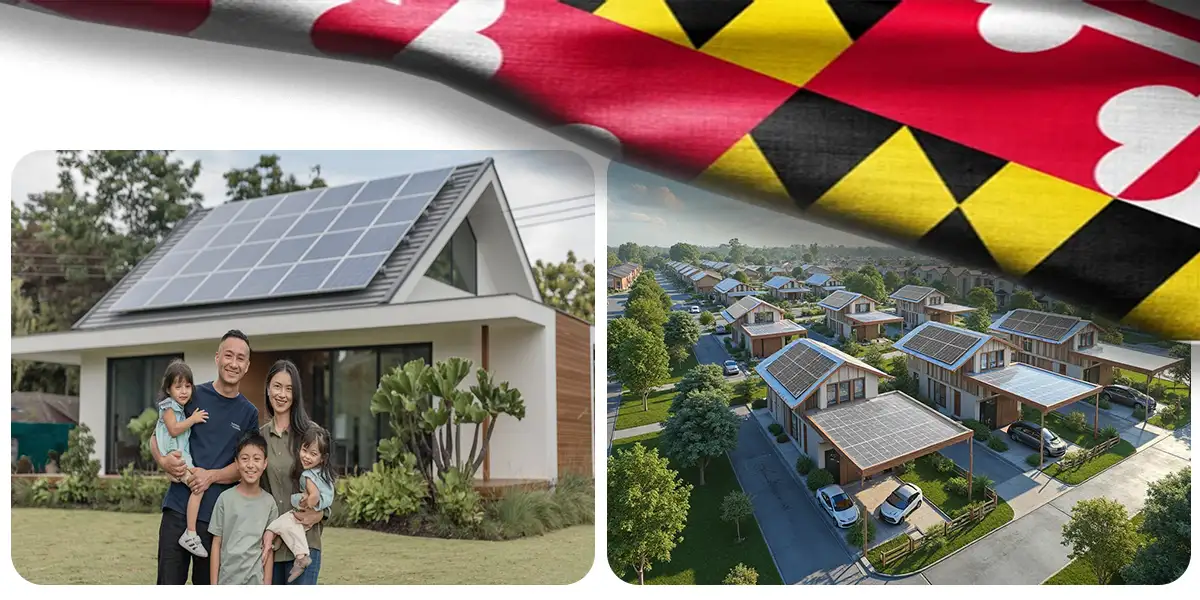
Lawmakers have approved a trio of new bills to support solar in Maryland. This bill’s approval came just hours before the end of the 2025 legislative session. The package includes three bills. These bills emphasize helping low- and moderate-income families, cutting energy costs, boosting in-state power generation, and preparing the state for climate change challenges. Senate President Bill Ferguson expressed strong support. He said he feels “very confident” that Gov. Wes Moore will sign the bills. The goal is to protect residents in Maryland from rising electricity costs, improve grid stability, and expand access to clean, local energy, especially solar energy in Maryland.
Bills Focus on Consumer Relief and Energy Supply
These laws introduce strict rules to make sure energy providers manage their costs more responsibly. One key part of this initiative is the “Legislative Energy Relief Refund,” which will give the average household about $80 back next year. This initiative is aimed at helping homeowners reduce their electricity bills. In addition, the legislation promotes local power generation, with a strong push for solar in Maryland. Clean energy growth is central to this initiative, especially through programs like the Maryland solar program and expanded support for Maryland solar incentives.
Summer Heat and Power Problems Growing
As climate disasters and extreme weather increase, ensuring the community has reliable and affordable access to energy is more important. Also, summertime hot spots are turning into heat domes. Many electrical providers are still unable to meet demand, while the entire electric infrastructure is at risk of becoming unstable.
However, solar power Maryland and home batteries step in. These clean energy sources ease pressure on the grid and offer backup power during emergencies. Residents are increasingly asking, “Are solar panels worth it in Maryland?” and these bills aim to make the answer a resounding yes.
The Brighter Tomorrow Act: Upfront Help for Families
One of the laws, named the Brighter Act, is bringing real help to Maryland families. It requires the Maryland Energy Administration to set aside $10 million. That money will go towards free or low-cost solar installations for low-income households.
This makes solar panels Maryland more accessible to families who previously couldn’t afford them. With this support, more people can lower their bills without high upfront costs.
The Drive Act: Solar and Batteries Working Together
The Drive Act law supports virtual power plants (VPP). This law is all getting the most out of solar panels and home batteries. When connected, these homes can send power back to the grid, especially when the demand is high. This keeps the lights on when the grid is off. The Drive Act encourages utilities to build and support these smart networks through Maryland net metering and promote solar in Maryland on a larger scale.
The Empower Act: Fair Pay for Battery Users
The Empower Act makes sure that people who purchase home batteries receive just compensation when they share energy with their community. This law rewards those who take steps to improve energy reliability and help others during blackouts.
Incentives like these, along with the Maryland solar tax credit, make solar and battery systems more appealing and fair for everyday residents.
Moving Toward Clean and Reliable Energy
Many states in the US are working to protect residents from power outages caused by storms and floods. Maryland is playing its part by putting solar in Maryland at the center of its plan. The three new laws work together and help in reducing energy costs, increasing clean energy use, and preparing communities for weather risks.
From offering Maryland solar panels to rewarding energy-sharing programs, the state is taking major steps forward. With the growing demand for cleaner energy and concerns about the cost of solar panels in Maryland, many homeowners are now exploring options through the best solar companies in Maryland.
To conclude, Maryland is taking strong actions to support renewable energy and help low income families reduce energy costs. The 3 new bills, The Brighter Tomorrow Act, The Divine Act, and the Empower Act, together help in building a clean , safer and affordable energy future for Maryland residents, all powered by solar energy in Maryland.
News Source: Renewable Energy World
